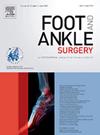Automatic Hardy and Clapham’s classification of hallux sesamoid position on foot radiographs using deep neural network
IF 1.9
3区 医学
Q2 ORTHOPEDICS
引用次数: 0
Abstract
Background
There is currently no deep neural network (DNN) capable of automatically classifying tibial sesamoid position (TSP) on foot radiographs.
Methods
A DNN was developed to predict TSP according to the Hardy and Clapham’s classification. A total of 1554 foot radiographs were used for model development. The validation of the model was conducted using radiographs obtained from 113 consecutive first-visit patients of our foot and ankle clinic. On these 113 radiographs, TSP was independently classified by three foot and ankle surgeons and the DNN, and their results were compared. The weighted kappa value of TSP between the DNN prediction and the median of the three surgeons (KAI) was calculated.
Results
The KAI was 0.95 (95 %CI: 0.85- 1.00), indicating sufficient consistency between the surgeons and the DNN.
Conclusions
We have developed a DNN for automated TSP classification that demonstrates sufficient consistency with foot and ankle surgeons.
Levels of evidence
Level 3 - Retrospective Cohort Study.
利用深度神经网络对脚部 X 射线照片上的拇指芝麻状突起位置进行 Hardy 和 Clapham's 自动分类。
背景:目前还没有一种深度神经网络(DNN)能够自动对足部 X 射线照片上的胫骨剑突位置(TSP)进行分类:方法:根据 Hardy 和 Clapham 的分类方法,开发了一个 DNN 来预测 TSP。模型开发共使用了 1554 张足部 X 光片。我们使用足踝诊所 113 名连续初诊患者的 X 光片对模型进行了验证。三名足踝外科医生和 DNN 分别对这 113 张照片上的 TSP 进行了独立分类,并对他们的结果进行了比较。计算了 DNN 预测与三位外科医生中位数之间 TSP 的加权卡帕值(KAI):结果:KAI 为 0.95(95 %CI:0.85- 1.00),表明外科医生与 DNN 之间有足够的一致性:我们开发了一种用于自动 TSP 分类的 DNN,该 DNN 与足踝外科医生之间具有充分的一致性:3级--回顾性队列研究。
本文章由计算机程序翻译,如有差异,请以英文原文为准。
求助全文
约1分钟内获得全文
求助全文
来源期刊

Foot and Ankle Surgery
ORTHOPEDICS-
CiteScore
4.60
自引率
16.00%
发文量
202
期刊介绍:
Foot and Ankle Surgery is essential reading for everyone interested in the foot and ankle and its disorders. The approach is broad and includes all aspects of the subject from basic science to clinical management. Problems of both children and adults are included, as is trauma and chronic disease. Foot and Ankle Surgery is the official journal of European Foot and Ankle Society.
The aims of this journal are to promote the art and science of ankle and foot surgery, to publish peer-reviewed research articles, to provide regular reviews by acknowledged experts on common problems, and to provide a forum for discussion with letters to the Editors. Reviews of books are also published. Papers are invited for possible publication in Foot and Ankle Surgery on the understanding that the material has not been published elsewhere or accepted for publication in another journal and does not infringe prior copyright.
 求助内容:
求助内容: 应助结果提醒方式:
应助结果提醒方式:


